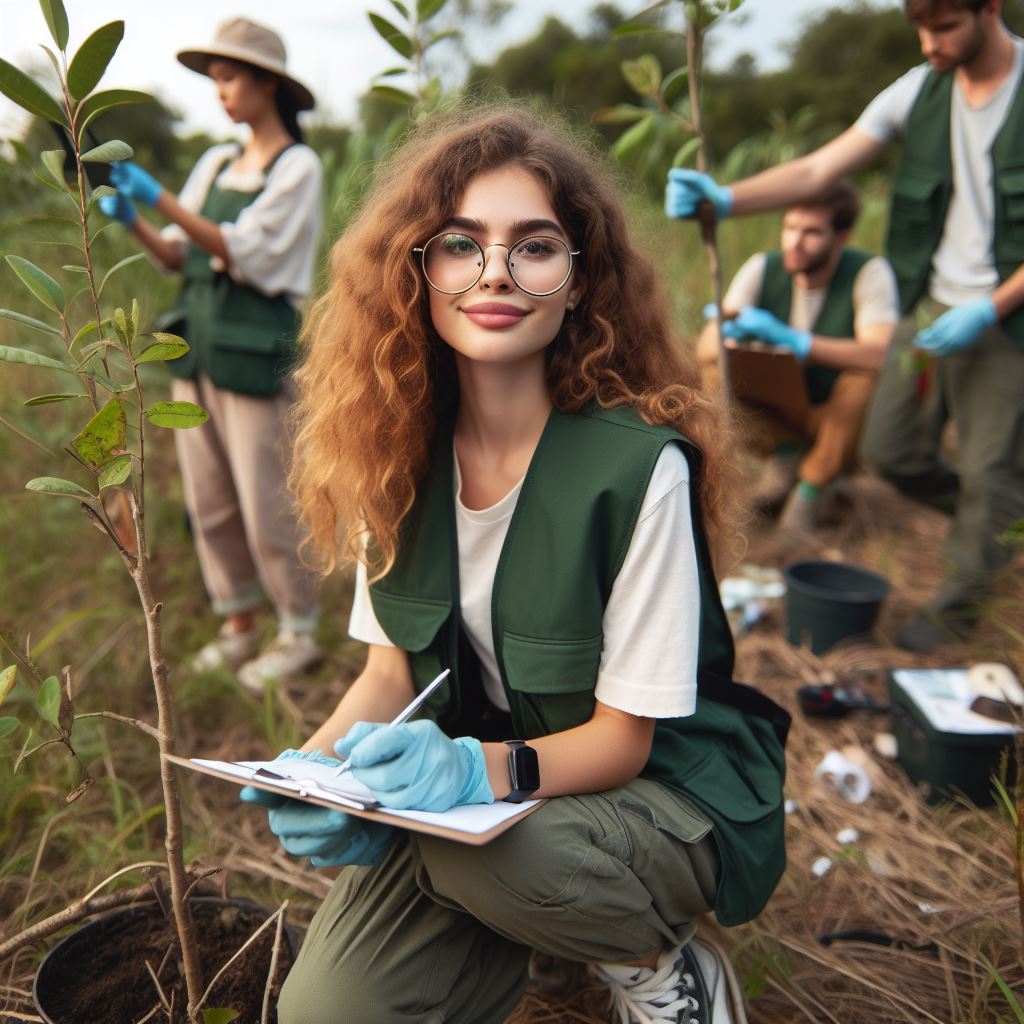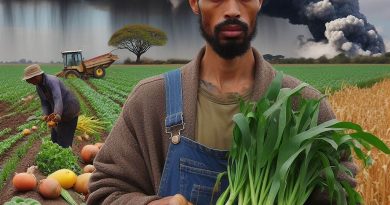How to Become a Conservation Scientist
Last Updated on January 15, 2024
Introduction
Embarking on a journey to become a conservation scientist opens doors to impactful environmental stewardship. Key considerations include:
- Educational Path: Explore academic routes, such as obtaining a bachelor’s degree in environmental science or related fields.
- Specialization: Identify specific conservation areas like wildlife biology, forestry, or marine conservation to tailor your expertise.
- Advanced Degrees: Consider pursuing master’s or Ph.D. programs to deepen knowledge and enhance research capabilities.
- Practical Experience: Engage in internships, fieldwork, or research projects to gain hands-on experience and develop practical skills.
- Networking: Build connections with professionals, attend conferences, and participate in workshops to expand your network within the conservation community.
- Stay Informed: Keep abreast of current research, technological advancements, and emerging trends in conservation science.
Embarking on this educational and experiential journey lays the foundation for a rewarding career in conservation science.
Education and Academic Background
Necessary educational requirements for becoming a conservation scientist
To embark on a rewarding career as a conservation scientist, fulfill specific educational requirements and follow these essential steps:
- Obtain a Bachelor’s Degree: Your journey starts with earning a bachelor’s degree.
- Focus on Relevant Fields: Concentrate on pertinent fields during your bachelor’s studies, such as environmental science.
- Environmental Science: This major offers a comprehensive understanding of conservation-relevant aspects in the environment.
List relevant fields of study, such as environmental science, biology, ecology, or natural resource management
- Biology: Build a strong foundation in biology to comprehend the living organisms affected by conservation efforts.
- Ecology: Study ecology to grasp intricate relationships between organisms and their environment, fundamental to effective conservation.
- Natural Resource Management: Gain knowledge in managing natural resources sustainably, a critical aspect of conservation science.
- Pursue a Master’s Degree or Ph.D.: Enhance your career prospects by advancing to a master’s degree or Ph.D.
Importance of choosing a reputable and accredited institution for higher education
- Choose a Reputable Institution: Opt for a reputable and accredited institution for higher education.
- Research Opportunities: Look for institutions with robust research programs in conservation science, offering hands-on experience.
- Faculty Expertise: Consider faculty expertise in conservation science for an enriched learning experience and professional development.
- Network Opportunities: Select institutions with strong networks to conservation organizations, agencies, and professionals.
- Internships and Field Experiences: Seek programs offering practical experiences in real-world conservation settings, building valuable skills.
- Continuing Education: Understand that your journey continues with lifelong learning through workshops, conferences, and staying updated.
Following these steps and focusing on the right fields at reputable institutions ensures a successful path to becoming a conservation scientist.
Read: A Guide to Starting a Farm in Canada
Gaining Field Experience
Gaining vital field experience enriches aspiring conservation scientists’ skills and deepens their understanding of ecosystems.
In wildlife, rehabilitation centers understands the intersection of conservation and animal welfare.
Internship opportunities
Internships and volunteer opportunities provide hands-on experience, applying theoretical knowledge to practical situations.
Collaborating with experienced professionals offers mentorship, gaining insights and practical guidance in conservation practices.
Participating in field research projects actively contributes to conservation efforts and enhances research skills.
Engaging in community-based conservation initiatives fosters a deeper connection, promoting grassroots conservation.
Volunteering at local wildlife refuges, national parks, or conservation projects
Enrolling in wildlife monitoring programs helps understand species behavior, contributing crucial data for conservation management.
Involvement in environmental impact assessments assesses and mitigates potential threats to ecosystems.
Contributing to restoration projects allows witnessing the positive impact on biodiversity and ecosystem health.
Conducting biodiversity surveys assesses the variety of species in specific habitats, informing conservation strategies.
Engaging in collaborative conservation programs involves multiple stakeholders, fostering teamwork and a holistic conservation approach.
Exploring remote sensing techniques gathers data on landscapes, aiding in effective conservation planning.
Acquiring GIS (Geographic Information System) training analyzes spatial data, crucial for mapping and monitoring conservation areas.
Attending conservation workshops focuses on field methodologies, learning practical skills applicable to real-world scenarios.
Contributing to ecotourism initiatives balances conservation with economic sustainability, providing a unique perspective on challenges.
Collaborating with Indigenous communities respects and incorporates traditional ecological knowledge into conservation practices.
Participating in climate change research projects comprehends broader environmental challenges impacting conservation efforts.
Opting for experiential learning programs simulates real-world scenarios, preparing for diverse conservation challenges.
Engaging in scientific diving or snorkeling activities, if applicable, studies marine ecosystems and contributes to marine conservation.
Joining conservation NGOs actively contributes to initiatives and gains exposure to diverse projects.
Exploring international conservation experiences broadens understanding of global conservation issues and approaches.
Actively engaging in these field experiences, aspiring conservation scientists develop practical expertise, contributing significantly to biodiversity protection.
Read: Canadian Farming Subsidies Explained
Developing Key Skills and Knowledge
Essential skills required for becoming a successful conservation scientist
To become a successful conservation scientist, several key skills are crucial.
Firstly, research skills are essential for conducting studies and gathering data to inform conservation strategies.
Data analysis skills enable scientists to interpret and draw meaningful conclusions from their research findings.
Problem-solving skills are vital for identifying and addressing complex conservation challenges.
Additionally, critical thinking skills allow scientists to evaluate information critically and make informed decisions.
The Need for Strong Knowledge in Relevant Subjects
Being well-versed in subjects such as ecology, wildlife biology, environmental policy, and conservation ethics is imperative for conservation scientists.
Ecology provides an understanding of the relationships among organisms and their environment, which is fundamental for effective conservation efforts.
Knowledge of wildlife biology helps scientists comprehend the behavior, habitats, and population dynamics of different species, which is vital for conservation planning.
Familiarity with environmental policy allows scientists to navigate legal and regulatory frameworks, advocating for impactful conservation measures.
Furthermore, conservation ethics help scientists make ethically sound decisions when addressing conservation issues.
Encouraging Continuous Learning
To excel in conservation science, professionals must actively engage in continuous learning, adapting to the evolving field’s demands.
Regularly reading scientific literature exposes them to the latest research, enriching their knowledge base with cutting-edge developments.
Participating in workshops and training sessions equips scientists with new techniques, methodologies, and tools essential for effective conservation practices.
Conferences not only facilitate knowledge exchange but also foster collaboration, enhancing scientists’ career prospects through valuable networking opportunities.
Incorporating these strategies into one’s career path significantly contributes to becoming a successful conservation scientist.
It’s crucial to recognize that acquiring skills and knowledge is an ongoing journey rather than a one-time process.
Adapting to emerging challenges, conservation scientists must continuously learn, ensuring they remain at the forefront of their dynamic field.
Hands-on experience through internships or volunteer work is essential, providing practical application and a deeper understanding of conservation complexities.
Collaborating with experienced professionals offers mentorship opportunities and valuable guidance in navigating the intricacies of conservation work.
Developing effective communication skills is paramount for conservation scientists to convey findings, engage stakeholders, and advocate for conservation efforts.
Strong communication bridges the gap between scientific knowledge and public understanding, garnering support for conservation initiatives.
Becoming a successful conservation scientist requires honing essential skills such as research, data analysis, problem-solving, and critical thinking.
A robust knowledge base in ecology, wildlife biology, environmental policy, and conservation ethics is fundamental for impactful contributions.
Continuous learning, achieved through reading, attending workshops, and participating in conferences, empowers aspiring conservation scientists to make meaningful contributions to biodiversity preservation.
Read: The Economics of Farming in Canada

Networking and Professional Associations
The importance of networking in the field of conservation science
Networking plays a crucial role in the field of conservation science.
It allows professionals to connect, collaborate, and share knowledge and resources, ultimately contributing to the effective conservation of our planet.
One way to enhance networking opportunities is by joining professional associations and societies related to conservation.
These organizations bring together individuals with a shared interest in conservation science, offering a platform to exchange ideas and stay updated with the latest developments in the field.
Professional associations and societies related to conservation
One prominent association is the Society for Conservation Biology (SCB).
SCB is an international network of conservation professionals dedicated to promoting the science and practice of conserving Earth’s biological diversity.
By joining SCB, conservation scientists can connect with like-minded professionals, participate in regional and global conferences, and access valuable resources and publications.
Another notable association is the International Union for Conservation of Nature (IUCN).
IUCN is a global organization committed to biodiversity conservation and sustainable development.
It provides a platform for scientists, policymakers, and practitioners to collaborate and address conservation challenges at a global scale.
Membership in IUCN opens doors to networking opportunities through participation in expert groups, workshops, and conferences.
Join these associations to connect with like-minded professionals, access resources and job opportunities, and attend conferences and events
Being part of these professional associations not only allows conservation scientists to network but also provides access to various resources.
Associations often offer journals, publications, and online platforms where members can share their research, findings, and best practices.
This exchange of knowledge can be invaluable in fostering innovation and advancing the field of conservation science.
Moreover, professional associations regularly host conferences, workshops, and events that provide opportunities for networking and professional development.
These gatherings bring together experts, scientists, policymakers, and practitioners from around the world, creating a conducive environment for collaboration, learning, and mentorship.
Attending conferences and events organized by these associations offers conservation scientists the chance to interact with leaders in the field, present their research, and gain insights into emerging trends and challenges.
These experiences can expand professional networks, create collaboration opportunities, and enhance career prospects.
Notably, networking in the field of conservation science extends beyond formal associations.
It encompasses building relationships with colleagues, mentors, and experts in the field.
Collaboration within research projects, attending seminars and workshops, and participating in fieldwork are all avenues for networking and establishing meaningful connections.
Overall, networking and joining professional associations are essential for conservation scientists.
These opportunities enable them to connect with like-minded professionals, access resources, and stay updated with the latest advancements in the field.
By actively engaging in networking, conservation scientists contribute to the collective effort of protecting and conserving Earth’s biodiversity for future generations.
Read: Urban Farming: Canada’s New Trend?
Career Paths and Job Prospects
Potential career paths for conservation scientists
Conservation scientists have a range of potential career paths to choose from.
These include:
- Working for government agencies: Many conservation scientists find employment in government departments
- Research institutions: Conservation scientists can work in research institutions, conducting studies and experiments
- Non-profit organizations: Many non-profit organizations focus on conservation efforts and employ scientists in various roles
- Consulting firms: Some conservation scientists work for consulting firms, providing expertise to clients
Insight into job prospects and demand for conservation scientists
The job prospects for conservation scientists are generally promising.
As awareness of environmental issues continues to grow, there is an increasing demand for professionals in this field.
Governments, organizations, and communities are recognizing the importance of conservation and are investing in scientific research and management efforts.
One appealing aspect of a career as a conservation scientist is the opportunity to specialize in various areas.
Depending on their interests and skills, conservation scientists may focus on:
- Ecosystem restoration: This specialization involves working on projects that aim to restore and rehabilitate damaged ecosystems.
- Endangered species management: Conservation scientists specializing in this area focus on protecting and preserving endangered species.
- Climate change mitigation: Some scientists choose to specialize in studying and developing strategies to mitigate the impacts of climate change.
Conservation scientist roles may vary depending on specialization
By specializing, conservation scientists can develop deep expertise in a specific area and contribute to targeted conservation efforts.
Job responsibilities for conservation scientists can vary depending on their chosen career path and specialization.
Generally, their tasks include:
- Conducting field surveys and research to collect data on ecosystems, species, or environmental issues
- Analyzing collected data to assess the state of the environment and identify conservation needs
- Developing and implementing conservation plans and strategies
- Collaborating with other scientists, policymakers, and stakeholders to advocate for conservation initiatives
- Educating the public and raising awareness about environmental issues and conservation practices
Conservation scientists often have to work in challenging and remote environments, conducting extensive fieldwork to gather essential data.
They may also be required to present their findings in conferences and publish research papers to contribute to the scientific community’s knowledge.
Essentially, conservation science offers a range of career paths, including government agencies, research institutions, non-profit organizations, and consulting firms.
Job prospects are promising due to increasing environmental awareness.
Specializations in ecosystem restoration, endangered species management, or climate change mitigation provide opportunities to focus efforts.
Conservation scientists have diverse responsibilities, including research, planning, advocacy, and education.
Conclusion
Becoming a conservation scientist requires a combination of education, field experience, skills, and networking.
It is important to pursue a passion for conservation and make a positive impact on the environment.
By obtaining a solid educational foundation, gaining hands-on experience in the field, developing essential skills, and building a strong network of professionals, individuals can successfully embark on a career as a conservation scientist.
Remember, the work of conservation scientists is crucial for the protection and preservation of our natural resources.
Whether it is conducting research, designing conservation strategies, or implementing sustainable practices, conservation scientists play a vital role in ensuring the long-term health of our environment.
So, if you have a passion for conservation and a desire to make a difference, don’t hesitate to pursue this rewarding profession.
With dedication and perseverance, you can become a conservation scientist and contribute to the sustainable future we all strive for.


